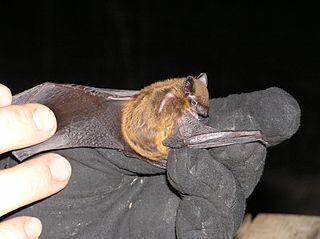
Nycticeius is a small genus of bats in the vesper bat family, Vespertilionidae. It contains three species, the evening bat, the Cuban evening bat and Nycticeius aenobarbus. Some authorities include several other Old World species in Nycticeius, but recent genetic work shows that is a completely New World genus. Nycticeius is of Greek and Latin origin, meaning "belonging to the night".

The evening bat is a species of bat in the vesper bat family that is native to North America. Hunting at night, they eat beetles, moths, and other flying insects.
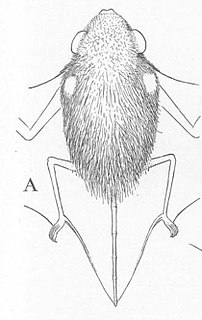
Allen's spotted bat is a species of vesper bat in the family Vespertilionidae found in the following countries: the Central African Republic, the Democratic Republic of the Congo, Kenya, and Uganda. It is found in subtropical or tropical moist lowland forests.

The tawny-shouldered blackbird is a species of bird in the family Icteridae. It is found in Cuba and Hispaniola. It is a vagrant in the United States.

The black-chested sparrow is a species of bird in the family Passerellidae that is endemic to Mexico. Its natural habitats are subtropical or tropical dry shrubland and subtropical or tropical high-altitude shrubland.
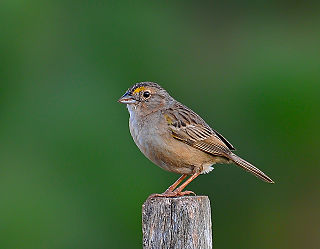
The grassland sparrow is a species of bird in the family Passerellidae. It is found in Argentina, Bolivia, Brazil, Colombia, French Guiana, Guyana, Paraguay, Peru, Suriname, Uruguay, and Venezuela. Its natural habitats are dry savannah, subtropical or tropical seasonally wet or flooded lowland grassland, and pastureland.

Pangasius is a genus of medium-large to very large shark catfishes native to fresh water in South and Southeast Asia. The term "pangasius" is sometimes used to specifically refer to the commercially important basa fish, P. bocourti.
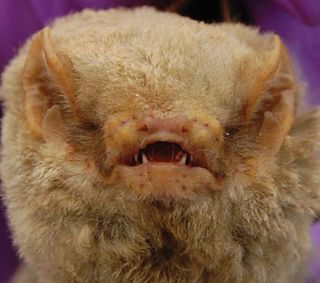
Glauconycteris is a genus of vespertilionid bats in Africa.
The Cuban evening bat is a species of bat in the vesper bat family, Vespertilionidae, that is endemic to western Cuba. It is a small bat, even smaller than cogener Nycticeius humeralis. It is insectivorous, but otherwise little is known about its behavior and diet.

The northern fiscal is a member of the shrike family found through most of Sub-Saharan Africa. It used to be grouped with the southern fiscal. Together they were called the common fiscal.
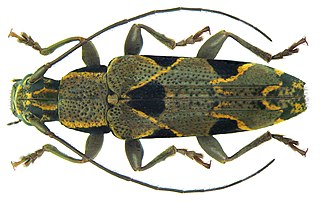
Tmesisternini is a tribe of beetles in the subfamily Lamiinae containing the following genera:
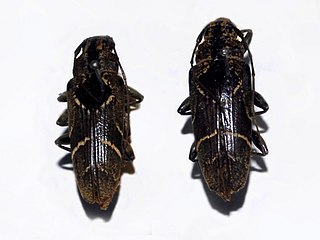
Tmesisternus is a genus of longhorn beetles belonging to the family Cerambycidae, subfamily Lamiinae.
Megalofrea humeralis is a species of beetle in the family Cerambycidae. It was described by Vollehoven in 1869. It is known from Madagascar.
Tmesisternus agriloides is a species of beetle in the family Cerambycidae. It was described by Francis Polkinghorne Pascoe in 1867.

Tmesisternus distinctus is a species of beetle in the family Cerambycidae. It was described by Jean Baptiste Boisduval in 1835.
Tmesisternus dubius is a species of beetle in the family Cerambycidae. It was described by Xavier Montrouzier in 1855.
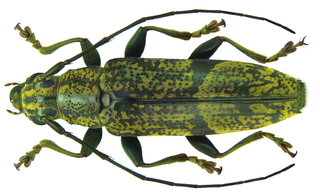
Tmesisternus griseus is a species of beetle in the family Cerambycidae. It was described by James Thomson in 1865.
Tmesisternus jaspideus is a species of beetle in the family Cerambycidae. It was described by Jean Baptiste Boisduval in 1835.
Tmesisternus schaumii is a species of beetle in the family Cerambycidae. It was described by Francis Polkinghorne Pascoe in 1867. It is known from Moluccas, Australia, and the Solomon Islands.
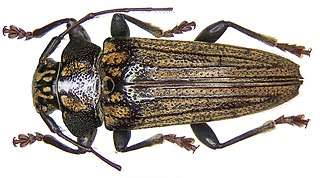
Tmesisternus venatus is a species of beetle in the family Cerambycidae. It was described by James Thomson in 1864.












